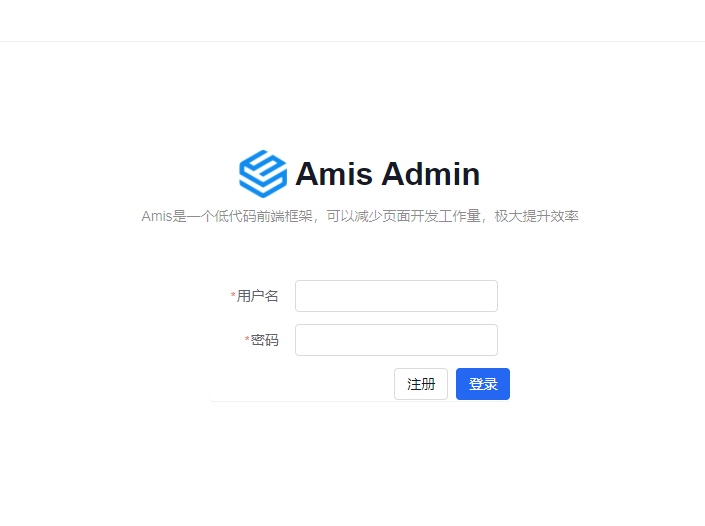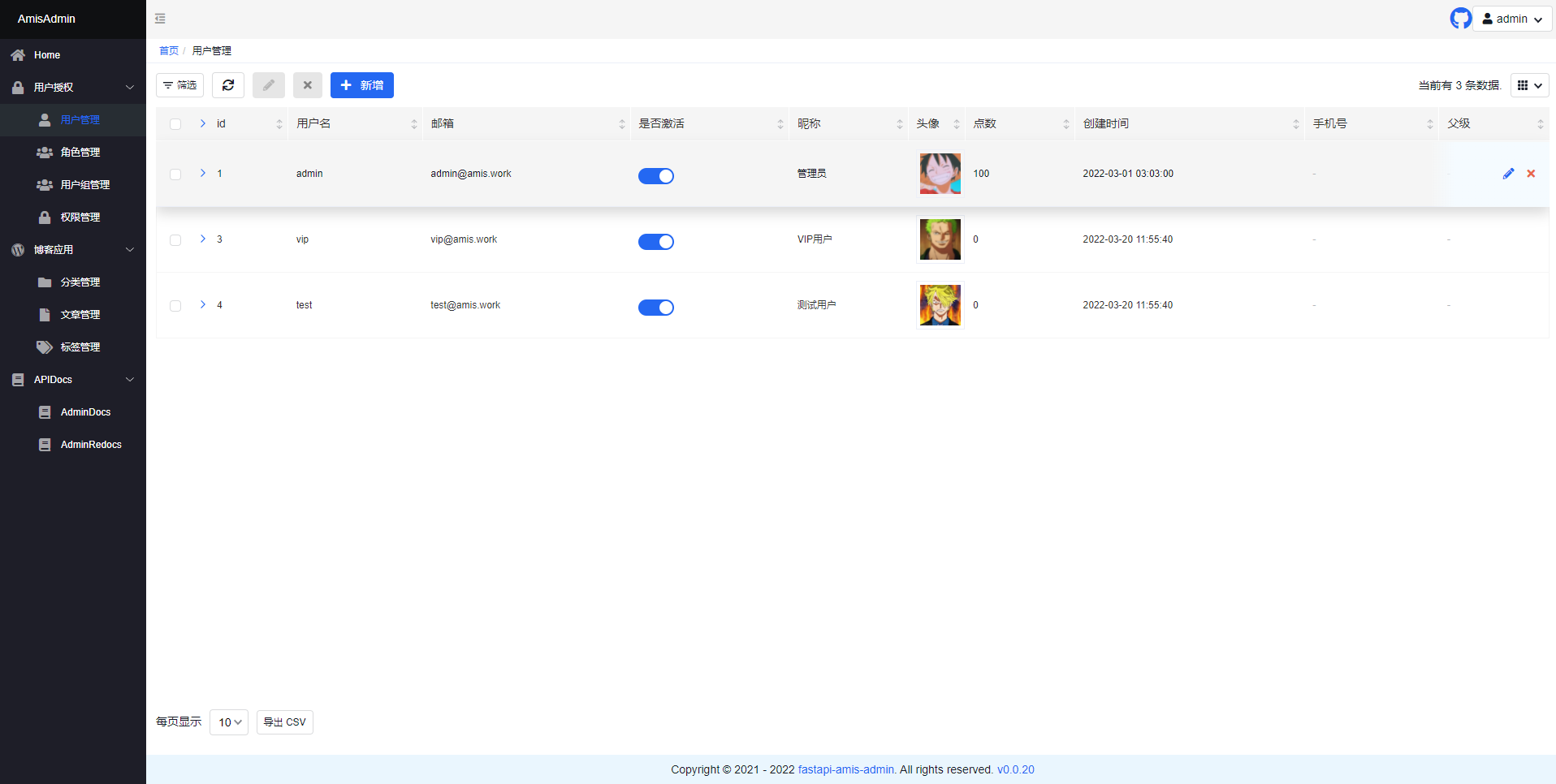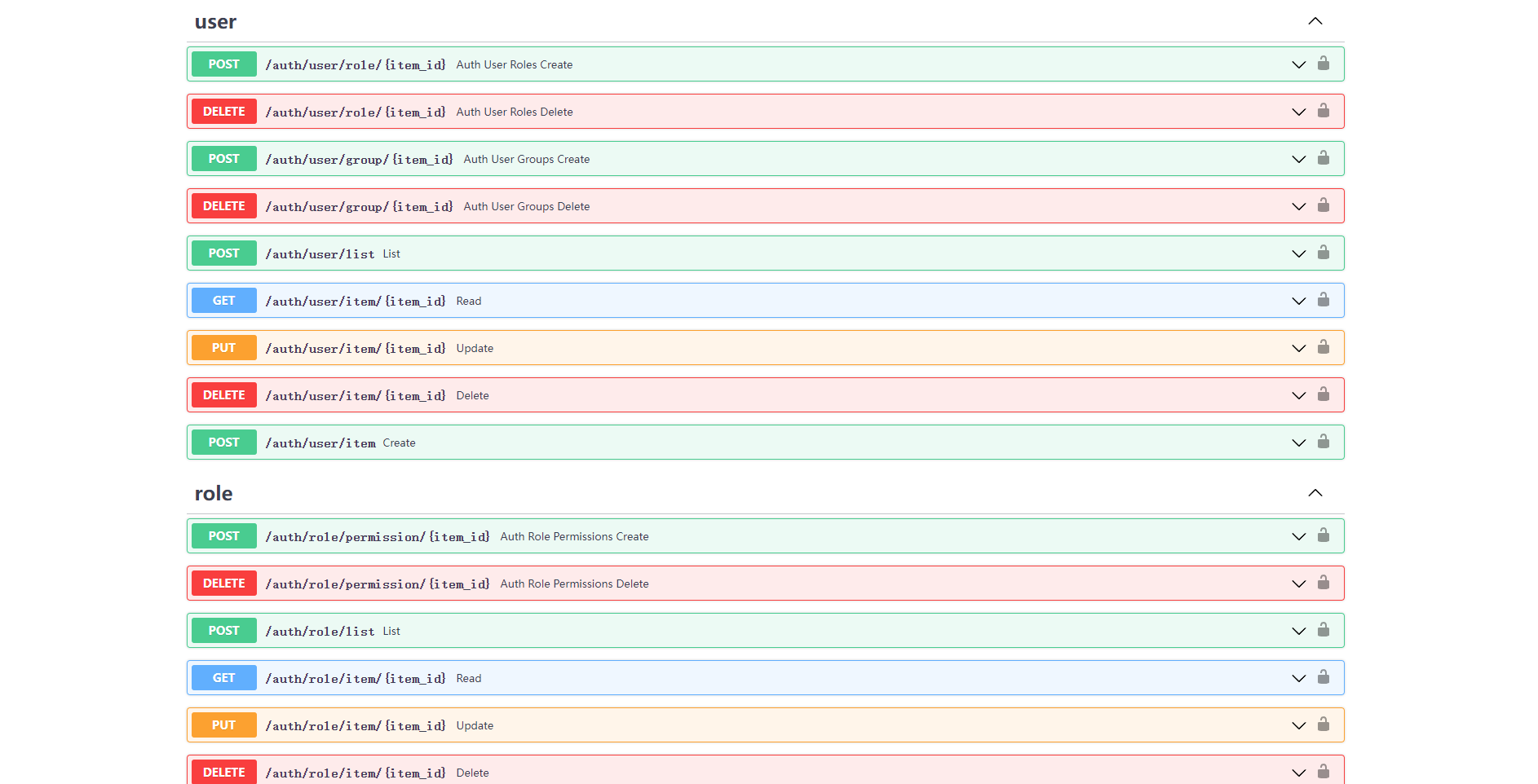[简体中文](https://github.com/amisadmin/fastapi_user_auth/blob/master/README.zh.md)
| [English](https://github.com/amisadmin/fastapi_user_auth)
# Project Introduction
<h2 align="center">
FastAPI-User-Auth
</h2>
<p align="center">
<em>FastAPI-User-Auth is a simple and powerful FastAPI user RBAC authentication and authorization library.</em><br/>
<em>It is based on FastAPI-Amis-Admin and provides a freely extensible visual management interface.</em>
</p>
<p align="center">
<a href="https://github.com/amisadmin/fastapi_amis_admin/actions/workflows/pytest.yml" target="_blank">
<img src="https://github.com/amisadmin/fastapi_amis_admin/actions/workflows/pytest.yml/badge.svg" alt="Pytest">
</a>
<a href="https://pypi.org/project/fastapi_user_auth" target="_blank">
<img src="https://badgen.net/pypi/v/fastapi-user-auth?color=blue" alt="Package version">
</a>
<a href="https://pepy.tech/project/fastapi-user-auth" target="_blank">
<img src="https://pepy.tech/badge/fastapi-user-auth" alt="Downloads">
</a>
<a href="https://gitter.im/amisadmin/fastapi-amis-admin">
<img src="https://badges.gitter.im/amisadmin/fastapi-amis-admin.svg" alt="Chat on Gitter"/>
</a>
<a href="https://jq.qq.com/?_wv=1027&k=U4Dv6x8W" target="_blank">
<img src="https://badgen.net/badge/qq%E7%BE%A4/229036692/orange" alt="229036692">
</a>
</p>
<p align="center">
<a href="https://github.com/amisadmin/fastapi_user_auth" target="_blank">SourceCode</a>
·
<a href="http://user-auth.demo.amis.work/" target="_blank">OnlineDemo</a>
·
<a href="http://docs.amis.work" target="_blank">Documentation</a>
·
<a href="http://docs.gh.amis.work" target="_blank">Can't open the document?</a>
</p>
------
`FastAPI-User-Auth` It is an application plug -in based on [FastAPI-Amis-Admin](https://github.com/amisadmin/fastapi_amis_admin)
, which is deeply integrated to provide user authentication and authorization..
## Install
```bash
pip install fastapi-user-auth
```
## Simple example
```python
from fastapi import FastAPI
from fastapi_amis_admin.admin.settings import Settings
from fastapi_user_auth.site import AuthAdminSite
from starlette.requests import Request
from sqlmodel import SQLModel
# Create Fast API application
app = FastAPI()
# Create an Admin Site instance
site = AuthAdminSite(settings=Settings(database_url_async='sqlite+aiosqlite:///amisadmin.db'))
auth = site.auth
# Mount the Site management system to the FastAPI instance
site.mount_app(app)
# Create initialization database table
@app.on_event("startup")
async def startup():
await site.db.async_run_sync(SQLModel.metadata.create_all, is_session=False)
# Create default admin user,user name:admin,password:admin,please change it after login!!!
await auth.create_role_user('admin')
await auth.create_role_user('vip')
# Requirements: User must be logged in
@app.get("/auth/get_user")
@auth.requires()
def get_user(request: Request):
return request.user
if __name__ == '__main__':
import uvicorn
uvicorn.run(app, debug=True)
```
## Ways of identifying
### Decorator
- Recommended scenario: Single route. Supports synchronous and asynchronous routing.
```python
# Requirements: User must be logged in
@app.get("/auth/user")
@auth.requires()
def user(request: Request):
return request.user # current request user object.
# Authentication route: user has admin role
@app.get("/auth/admin_roles")
@auth.requires('admin')
def admin_roles(request: Request):
return request.user
# Requirement: User has vip role
# Support synchronous and asynchronous routing
@app.get("/auth/vip_roles")
@auth.requires(['vip'])
async def vip_roles(request: Request):
return request.user
# Requirements: User has admin role or vip role
@app.get("/auth/admin_or_vip_roles")
@auth.requires(roles=['admin', 'vip'])
def admin_or_vip_roles(request: Request):
return request.user
# Requirement: The user belongs to the admin user group
@app.get("/auth/admin_groups")
@auth.requires(groups=['admin'])
def admin_groups(request: Request):
return request.user
# Requirements: The user has the admin role and belongs to the admin user group
@app.get("/auth/admin_roles_and_admin_groups")
@auth.requires(roles=['admin'], groups=['admin'])
def admin_roles_and_admin_groups(request: Request):
return request.user
# Requirements: The user has the vip role and has the `article:update` permission
@app.get("/auth/vip_roles_and_article_update")
@auth.requires(roles=['vip'], permissions=['article:update'])
def vip_roles_and_article_update(request: Request):
return request.user
```
### Dependencies (recommended)
- Recommended scenarios: single route, route collection, FastAPI application.
```python
from fastapi import Depends
from typing import Tuple
from fastapi_user_auth.auth import Auth
from fastapi_user_auth.auth.models import User
# Route parameter dependencies, this method is recommended
@app.get("/auth/admin_roles_depend_1")
def admin_roles(user: User = Depends(auth.get_current_user)):
return user # or request.user
# Path manipulation decorator dependencies
@app.get("/auth/admin_roles_depend_2", dependencies=[Depends(auth.requires('admin')())])
def admin_roles(request: Request):
return request.user
# Global dependencies
# All requests under the app application require the admin role
app = FastAPI(dependencies=[Depends(auth.requires('admin')())])
@app.get("/auth/admin_roles_depend_3")
def admin_roles(request: Request):
return request.user
```
### Middleware
- Recommended Scenario: FastAPI Application
```python
app = FastAPI()
# Append `request.auth` and `request.user` objects before each request processing under the app
auth.backend.attach_middleware(app)
```
### Call directly
- Recommended scenarios: non-routing methods
```python
from fastapi_user_auth.auth.models import User
async def get_request_user(request: Request) -> Optional[User]:
# user= await auth.get_current_user(request)
if await auth.requires('admin', response=False)(request):
return request.user
else:
return None
```
## Token storage backend
`fastapi-user-auth` Supports multiple token storage methods. The default is: `DbTokenStore`, It is recommended to customize the modification to: `JwtTokenStore`
### JwtTokenStore
```python
from fastapi_user_auth.auth.backends.jwt import JwtTokenStore
from sqlalchemy.ext.asyncio import create_async_engine
from sqlalchemy_database import AsyncDatabase
# Create an asynchronous database engine
engine = create_async_engine(url='sqlite+aiosqlite:///amisadmin.db', future=True)
# Create auth object using `Jwt Token Store`
auth = Auth(
db=AsyncDatabase(engine),
token_store=JwtTokenStore(secret_key='09d25e094faa6ca2556c818166b7a9563b93f7099f6f0f4caa6cf63b88e8d3e7')
)
# Pass the auth object into the Admin Site
site = AuthAdminSite(
settings=Settings(database_url_async='sqlite+aiosqlite:///amisadmin.db'),
auth=auth
)
```
### DbTokenStore
```python
# Create auth object using `Db Token Store`
from fastapi_user_auth.auth.backends.db import DbTokenStore
auth = Auth(
db=AsyncDatabase(engine),
token_store=DbTokenStore(db=AsyncDatabase(engine))
)
```
### RedisTokenStore
```python
# Create auth object using `Redis Token Store`
from fastapi_user_auth.auth.backends.redis import RedisTokenStore
from aioredis import Redis
auth = Auth(
db=AsyncDatabase(engine),
token_store=RedisTokenStore(redis=Redis.from_url('redis://localhost?db=0'))
)
```
## RBAC model
The `RBAC` model adopted by this system is as follows, you can also expand it according to your own needs.
- Reference: [Design of Permission System](https://blog.csdn.net/qq_25889465/article/details/98473611)
```mermaid
flowchart LR
User -. m:n .-> Group
User -. m:n .-> Role
Group -. m:n .-> Role
Role -. m:n .-> Perimission
```
## Advanced Extension
```bash
### Extending the `User` model
```python
from datetime import date
from fastapi_amis_admin.models.fields import Field
from fastapi_user_auth.auth.models import User
# Customize `User` model, inherit `User`
class MyUser(User, table = True):
point: float = Field(default = 0, title = 'Source', description = 'User source')
phone: str = Field(None, title = 'Phone number', max_length = 15)
parent_id: int = Field(None, title = "Superior", foreign_key = "auth_user.id")
birthday: date = Field(None, title = "Date of birth")
location: str = Field(None, title = "Location")
# Create an auth object using a custom `User` model
auth = Auth(db = AsyncDatabase(engine), user_model = MyUser)
```
### Extend the `Role`, `Group`, `Permission` models
```python
from fastapi_amis_admin.models.fields import Field
from fastapi_user_auth.auth.models import Group
# Customize the `Group` model, inherit `Base RBAC`; override the `Role`, the `Permission` model is similar,
# the difference is the table name.
class MyGroup(Group, table=True):
__tablename__ = 'auth_group' # Database table name, must be this to override the default model
icon: str = Field(None, title='Icon')
is_active: bool = Field(default=True, title="Activate now")
```
### Custom `User Auth App` default management class
Default management classes can be overridden and replaced by inheritance.
For Example: `UserLoginFormAdmin`,`UserRegFormAdmin`,`UserInfoFormAdmin`,
`UserAdmin`,`GroupAdmin`,`RoleAdmin`,`PermissionAdmin`
```python
# Customize the model management class, inherit and override the corresponding default management class
class MyGroupAdmin(admin.ModelAdmin):
page_schema = PageSchema(label='用户组管理', icon='fa fa-group')
model = MyGroup
link_model_fields = [Group.roles]
readonly_fields = ['key']
# Customize the user authentication application, inherit and override the default user authentication application
class MyUserAuthApp(UserAuthApp):
GroupAdmin = MyGroupAdmin
# Customize the user management site, inherit and override the default user management site
class MyAuthAdminSite(AuthAdminSite):
UserAuthApp = MyUserAuthApp
# Create a site object using a custom `Auth Admin Site` class
site = MyAuthAdminSite(settings, auth=auth)
```
## Interface/UI preview
- Open `http://127.0.0.1:8000/admin/auth/form/login` in your browser:

- Open `http://127.0.0.1:8000/admin/` in your browser:

- Open `http://127.0.0.1:8000/admin/docs` in your browser:

## License
- `fastapi-amis-admin` is based on `Apache2.0` Open source is free to use and can be freely used for commercial purposes, but please clearly display the copyright information about Fast API-Amis-Admin in the display interface.
## Thanks
Thanks to the following developers for their contributions to FastAPI-User-Auth:
<a href="https://github.com/amisadmin/fastapi_user_auth/graphs/contributors">
<img src="https://contrib.rocks/image?repo=amisadmin/fastapi_user_auth" alt=""/>
</a>
Raw data
{
"_id": null,
"home_page": null,
"name": "nasone_userauth",
"maintainer": null,
"docs_url": null,
"requires_python": ">=3.7",
"maintainer_email": "Atomi <1456417373@qq.com>",
"keywords": "fastapi,fastapi-user-auth,fastapi-amis-admin,fastapi-auth,fastapi-users,fastapi-jwt-auth,sqlmodel",
"author": null,
"author_email": "Atomi <1456417373@qq.com>",
"download_url": "https://files.pythonhosted.org/packages/13/f5/9d2c92960ca23712e43ab4f620c894329cb793eeb45cfb3c0fc2c90c03ee/nasone_userauth-0.5.0.tar.gz",
"platform": null,
"description": "[\u7b80\u4f53\u4e2d\u6587](https://github.com/amisadmin/fastapi_user_auth/blob/master/README.zh.md)\n| [English](https://github.com/amisadmin/fastapi_user_auth)\n\n# Project Introduction\n\n<h2 align=\"center\">\n FastAPI-User-Auth\n</h2>\n<p align=\"center\">\n <em>FastAPI-User-Auth is a simple and powerful FastAPI user RBAC authentication and authorization library.</em><br/>\n <em>It is based on FastAPI-Amis-Admin and provides a freely extensible visual management interface.</em>\n</p>\n<p align=\"center\">\n <a href=\"https://github.com/amisadmin/fastapi_amis_admin/actions/workflows/pytest.yml\" target=\"_blank\">\n <img src=\"https://github.com/amisadmin/fastapi_amis_admin/actions/workflows/pytest.yml/badge.svg\" alt=\"Pytest\">\n </a>\n <a href=\"https://pypi.org/project/fastapi_user_auth\" target=\"_blank\">\n <img src=\"https://badgen.net/pypi/v/fastapi-user-auth?color=blue\" alt=\"Package version\">\n </a>\n <a href=\"https://pepy.tech/project/fastapi-user-auth\" target=\"_blank\">\n <img src=\"https://pepy.tech/badge/fastapi-user-auth\" alt=\"Downloads\">\n </a>\n <a href=\"https://gitter.im/amisadmin/fastapi-amis-admin\">\n <img src=\"https://badges.gitter.im/amisadmin/fastapi-amis-admin.svg\" alt=\"Chat on Gitter\"/>\n </a>\n <a href=\"https://jq.qq.com/?_wv=1027&k=U4Dv6x8W\" target=\"_blank\">\n <img src=\"https://badgen.net/badge/qq%E7%BE%A4/229036692/orange\" alt=\"229036692\">\n </a>\n</p>\n<p align=\"center\">\n <a href=\"https://github.com/amisadmin/fastapi_user_auth\" target=\"_blank\">SourceCode</a>\n \u00b7\n <a href=\"http://user-auth.demo.amis.work/\" target=\"_blank\">OnlineDemo</a>\n \u00b7\n <a href=\"http://docs.amis.work\" target=\"_blank\">Documentation</a>\n \u00b7\n <a href=\"http://docs.gh.amis.work\" target=\"_blank\">Can't open the document\uff1f</a>\n</p>\n\n------\n\n`FastAPI-User-Auth` It is an application plug -in based on [FastAPI-Amis-Admin](https://github.com/amisadmin/fastapi_amis_admin)\n, which is deeply integrated to provide user authentication and authorization..\n\n## Install\n\n```bash\npip install fastapi-user-auth\n```\n\n## Simple example\n\n```python\nfrom fastapi import FastAPI\nfrom fastapi_amis_admin.admin.settings import Settings\nfrom fastapi_user_auth.site import AuthAdminSite\nfrom starlette.requests import Request\nfrom sqlmodel import SQLModel\n\n# Create Fast API application\napp = FastAPI()\n\n# Create an Admin Site instance\nsite = AuthAdminSite(settings=Settings(database_url_async='sqlite+aiosqlite:///amisadmin.db'))\nauth = site.auth\n# Mount the Site management system to the FastAPI instance\nsite.mount_app(app)\n\n# Create initialization database table\n@app.on_event(\"startup\")\nasync def startup():\n await site.db.async_run_sync(SQLModel.metadata.create_all, is_session=False)\n # Create default admin user,user name:admin,password:admin,please change it after login!!!\n await auth.create_role_user('admin')\n await auth.create_role_user('vip')\n\n# Requirements: User must be logged in\n@app.get(\"/auth/get_user\")\n@auth.requires()\ndef get_user(request: Request):\n return request.user\n\nif __name__ == '__main__':\n import uvicorn\n\n uvicorn.run(app, debug=True)\n\n```\n\n## Ways of identifying\n\n### Decorator\n\n- Recommended scenario: Single route. Supports synchronous and asynchronous routing.\n\n```python\n# Requirements: User must be logged in\n@app.get(\"/auth/user\")\n@auth.requires()\ndef user(request: Request):\n return request.user # current request user object.\n\n# Authentication route: user has admin role\n@app.get(\"/auth/admin_roles\")\n@auth.requires('admin')\ndef admin_roles(request: Request):\n return request.user\n\n# Requirement: User has vip role\n# Support synchronous and asynchronous routing\n@app.get(\"/auth/vip_roles\")\n@auth.requires(['vip'])\nasync def vip_roles(request: Request):\n return request.user\n\n# Requirements: User has admin role or vip role\n@app.get(\"/auth/admin_or_vip_roles\")\n@auth.requires(roles=['admin', 'vip'])\ndef admin_or_vip_roles(request: Request):\n return request.user\n\n# Requirement: The user belongs to the admin user group\n@app.get(\"/auth/admin_groups\")\n@auth.requires(groups=['admin'])\ndef admin_groups(request: Request):\n return request.user\n\n# Requirements: The user has the admin role and belongs to the admin user group\n@app.get(\"/auth/admin_roles_and_admin_groups\")\n@auth.requires(roles=['admin'], groups=['admin'])\ndef admin_roles_and_admin_groups(request: Request):\n return request.user\n\n# Requirements: The user has the vip role and has the `article:update` permission\n@app.get(\"/auth/vip_roles_and_article_update\")\n@auth.requires(roles=['vip'], permissions=['article:update'])\ndef vip_roles_and_article_update(request: Request):\n return request.user\n\n```\n\n### Dependencies (recommended)\n\n- Recommended scenarios: single route, route collection, FastAPI application.\n\n```python\nfrom fastapi import Depends\nfrom typing import Tuple\nfrom fastapi_user_auth.auth import Auth\nfrom fastapi_user_auth.auth.models import User\n\n# Route parameter dependencies, this method is recommended\n@app.get(\"/auth/admin_roles_depend_1\")\ndef admin_roles(user: User = Depends(auth.get_current_user)):\n return user # or request.user\n\n# Path manipulation decorator dependencies\n@app.get(\"/auth/admin_roles_depend_2\", dependencies=[Depends(auth.requires('admin')())])\ndef admin_roles(request: Request):\n return request.user\n\n# Global dependencies\n# All requests under the app application require the admin role\napp = FastAPI(dependencies=[Depends(auth.requires('admin')())])\n\n@app.get(\"/auth/admin_roles_depend_3\")\ndef admin_roles(request: Request):\n return request.user\n\n```\n\n### Middleware\n\n- Recommended Scenario: FastAPI Application\n\n```python\napp = FastAPI()\n# Append `request.auth` and `request.user` objects before each request processing under the app\nauth.backend.attach_middleware(app)\n\n```\n\n### Call directly\n\n- Recommended scenarios: non-routing methods\n\n```python\nfrom fastapi_user_auth.auth.models import User\n\nasync def get_request_user(request: Request) -> Optional[User]:\n # user= await auth.get_current_user(request)\n if await auth.requires('admin', response=False)(request):\n return request.user\n else:\n return None\n\n```\n\n## Token storage backend\n\n`fastapi-user-auth` Supports multiple token storage methods. The default is: `DbTokenStore`, It is recommended to customize the modification to: `JwtTokenStore`\n\n### JwtTokenStore\n\n```python\nfrom fastapi_user_auth.auth.backends.jwt import JwtTokenStore\nfrom sqlalchemy.ext.asyncio import create_async_engine\nfrom sqlalchemy_database import AsyncDatabase\n\n# Create an asynchronous database engine\nengine = create_async_engine(url='sqlite+aiosqlite:///amisadmin.db', future=True)\n# Create auth object using `Jwt Token Store`\nauth = Auth(\n db=AsyncDatabase(engine),\n token_store=JwtTokenStore(secret_key='09d25e094faa6ca2556c818166b7a9563b93f7099f6f0f4caa6cf63b88e8d3e7')\n)\n\n# Pass the auth object into the Admin Site\nsite = AuthAdminSite(\n settings=Settings(database_url_async='sqlite+aiosqlite:///amisadmin.db'),\n auth=auth\n)\n\n```\n\n### DbTokenStore\n\n```python\n# Create auth object using `Db Token Store`\nfrom fastapi_user_auth.auth.backends.db import DbTokenStore\n\nauth = Auth(\n db=AsyncDatabase(engine),\n token_store=DbTokenStore(db=AsyncDatabase(engine))\n)\n```\n\n### RedisTokenStore\n\n```python\n# Create auth object using `Redis Token Store`\nfrom fastapi_user_auth.auth.backends.redis import RedisTokenStore\nfrom aioredis import Redis\n\nauth = Auth(\n db=AsyncDatabase(engine),\n token_store=RedisTokenStore(redis=Redis.from_url('redis://localhost?db=0'))\n)\n```\n\n## RBAC model\n\nThe `RBAC` model adopted by this system is as follows, you can also expand it according to your own needs.\n\n- Reference: [Design of Permission System](https://blog.csdn.net/qq_25889465/article/details/98473611)\n\n```mermaid\nflowchart LR\n\t User -. m:n .-> Group \n\t User -. m:n .-> Role \n Group -. m:n .-> Role \n\t Role -. m:n .-> Perimission \n```\n\n## Advanced Extension\n\n```bash\n### Extending the `User` model\n\n```python\nfrom datetime import date\n\nfrom fastapi_amis_admin.models.fields import Field\nfrom fastapi_user_auth.auth.models import User\n\n# Customize `User` model, inherit `User`\nclass MyUser(User, table = True):\n point: float = Field(default = 0, title = 'Source', description = 'User source')\n phone: str = Field(None, title = 'Phone number', max_length = 15)\n parent_id: int = Field(None, title = \"Superior\", foreign_key = \"auth_user.id\")\n birthday: date = Field(None, title = \"Date of birth\")\n location: str = Field(None, title = \"Location\")\n\n# Create an auth object using a custom `User` model\nauth = Auth(db = AsyncDatabase(engine), user_model = MyUser)\n```\n\n### Extend the `Role`, `Group`, `Permission` models\n\n```python\nfrom fastapi_amis_admin.models.fields import Field\nfrom fastapi_user_auth.auth.models import Group\n\n# Customize the `Group` model, inherit `Base RBAC`; override the `Role`, the `Permission` model is similar, \n# the difference is the table name.\nclass MyGroup(Group, table=True):\n __tablename__ = 'auth_group' # Database table name, must be this to override the default model\n icon: str = Field(None, title='Icon')\n is_active: bool = Field(default=True, title=\"Activate now\")\n\n```\n\n### Custom `User Auth App` default management class\n\nDefault management classes can be overridden and replaced by inheritance.\nFor Example: `UserLoginFormAdmin`,`UserRegFormAdmin`,`UserInfoFormAdmin`,\n`UserAdmin`,`GroupAdmin`,`RoleAdmin`,`PermissionAdmin`\n\n```python\n# Customize the model management class, inherit and override the corresponding default management class\nclass MyGroupAdmin(admin.ModelAdmin):\n page_schema = PageSchema(label='\u7528\u6237\u7ec4\u7ba1\u7406', icon='fa fa-group')\n model = MyGroup\n link_model_fields = [Group.roles]\n readonly_fields = ['key']\n\n# Customize the user authentication application, inherit and override the default user authentication application\nclass MyUserAuthApp(UserAuthApp):\n GroupAdmin = MyGroupAdmin\n\n# Customize the user management site, inherit and override the default user management site\nclass MyAuthAdminSite(AuthAdminSite):\n UserAuthApp = MyUserAuthApp\n\n# Create a site object using a custom `Auth Admin Site` class\nsite = MyAuthAdminSite(settings, auth=auth)\n```\n\n## Interface/UI preview\n\n- Open `http://127.0.0.1:8000/admin/auth/form/login` in your browser:\n\n\n\n- Open `http://127.0.0.1:8000/admin/` in your browser:\n\n\n\n- Open `http://127.0.0.1:8000/admin/docs` in your browser:\n\n\n\n## License\n\n- `fastapi-amis-admin` is based on `Apache2.0` Open source is free to use and can be freely used for commercial purposes, but please clearly display the copyright information about Fast API-Amis-Admin in the display interface.\n\n## Thanks\n\nThanks to the following developers for their contributions to FastAPI-User-Auth:\n\n<a href=\"https://github.com/amisadmin/fastapi_user_auth/graphs/contributors\">\n <img src=\"https://contrib.rocks/image?repo=amisadmin/fastapi_user_auth\" alt=\"\"/>\n</a>\n\n",
"bugtrack_url": null,
"license": null,
"summary": "FastAPI-User-Auth is a simple and powerful FastAPI user RBAC authentication and authorization library. Based on FastAPI-Amis-Admin and provides a freely extensible visual management interface.",
"version": "0.5.0",
"split_keywords": [
"fastapi",
"fastapi-user-auth",
"fastapi-amis-admin",
"fastapi-auth",
"fastapi-users",
"fastapi-jwt-auth",
"sqlmodel"
],
"urls": [
{
"comment_text": null,
"digests": {
"blake2b_256": "cba430100a28579eb1fe307726a536cc901b8b254519799e406e77337703cc04",
"md5": "38a8189184d3fb7465dd324c1202b873",
"sha256": "9fa06b3652e75114093882fad7a165a42b8a2b7aa5807f2eeaa0892781402aa8"
},
"downloads": -1,
"filename": "nasone_userauth-0.5.0-py3-none-any.whl",
"has_sig": false,
"md5_digest": "38a8189184d3fb7465dd324c1202b873",
"packagetype": "bdist_wheel",
"python_version": "py3",
"requires_python": ">=3.7",
"size": 23580,
"upload_time": "2023-04-01T13:30:28",
"upload_time_iso_8601": "2023-04-01T13:30:28.552519Z",
"url": "https://files.pythonhosted.org/packages/cb/a4/30100a28579eb1fe307726a536cc901b8b254519799e406e77337703cc04/nasone_userauth-0.5.0-py3-none-any.whl",
"yanked": false,
"yanked_reason": null
},
{
"comment_text": null,
"digests": {
"blake2b_256": "13f59d2c92960ca23712e43ab4f620c894329cb793eeb45cfb3c0fc2c90c03ee",
"md5": "a1325cdbc4d454fbde9586190c47d2c9",
"sha256": "5b4786f2dc7f2d972d7b8b6e04a1c7f50991563971b7e03152cf1705c451de34"
},
"downloads": -1,
"filename": "nasone_userauth-0.5.0.tar.gz",
"has_sig": false,
"md5_digest": "a1325cdbc4d454fbde9586190c47d2c9",
"packagetype": "sdist",
"python_version": "source",
"requires_python": ">=3.7",
"size": 89473,
"upload_time": "2023-04-01T13:30:40",
"upload_time_iso_8601": "2023-04-01T13:30:40.428268Z",
"url": "https://files.pythonhosted.org/packages/13/f5/9d2c92960ca23712e43ab4f620c894329cb793eeb45cfb3c0fc2c90c03ee/nasone_userauth-0.5.0.tar.gz",
"yanked": false,
"yanked_reason": null
}
],
"upload_time": "2023-04-01 13:30:40",
"github": false,
"gitlab": false,
"bitbucket": false,
"lcname": "nasone_userauth"
}